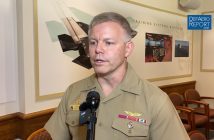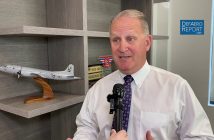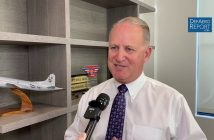Air Chief Marshall Sir Stuart Peach, Royal Air Force, the chairman of NATO’s Military Committee, discusses the importance of simplifying complex defense ideas for public discussion, the alliance recent Trident Juncture 2018 exercise and more with Defense & Aerospace Report Editor Vago Muradian at the Halifax International Security Forum in Nova Scotia, Canada. Our coverage was sponsored by L3 Technologies and Leonardo DRS.
Air Chief Marshal Sir Stuart Peach
Chairman, Military Committee of NATO
Halifax International Security Forum
November 2018
Vago Muradian: Welcome to the Defense and Aerospace Report. I’m Vago Muradian here at the Halifax International Security Forum in Nova Scotia, Canada, one of the world’s leading gatherings of military, national security, economic, diplomatic and civil society leaders from all around the world. Our coverage here is sponsored by L3 Technologies and Leonardo DRS, and it’s our positive honor to talk to Air Chief Marshal Sir Stuart Peach who is the Chairman of NATO’s Military Committee, the senior-most military officer advising the NATO Secretary General. Sir, it’s an honor to talk to you.
Air Chief Marshal Stuart Peach: Good to see you again.
Mr. Muradian: Absolutely.
At your panel discussion at the opening session when we were talking about sort of 100 years on, are we tired of winning. One of the points you made was the importance of communicating with publics. You know, at the end of the day it’s no Bucks, no Buck Rogers. You know, this is your fourth four-star billet which is an extraordinary run.
What do you think the communications challenge for the alliance is to make the case not just to citizens about the importance of the alliance, but also the importance of having to invest in that alliance to build capability and to build partnership?
Air Chief Marshal Peach: Well, the alliance of 29 provides collective security for almost one billion people. That’s a very positive story. Of course, it’s underpinned by a treaty. A treaty that’s stood the test of time for the Washington Treaty, which turns 70 next year. And within that sense we have military forces from across those 29 nations who are ready, willing and able to provide, both as a nuclear alliance and conventional, forces.
Mr. Muradian: What do you think the trick is to better communicating with publics writ large?
Air Chief Marshal Peach: I believe it’s all too easy to make complicated things complicated, and often what we need to do in the NATO as an alliance is make complicated things simple. And the simple fact is one billion people are made safe and secure by their contribution, their commitment to the alliance. And of course, it’s a commitment because it involves the contribution of forces.
Mr. Muradian: Capability development and thinking about the fundamental nature of future war has been something that’s preoccupied you for a very long time, whether you were at Joint Forces Command, whether you were Chief of Defence Staff for the United Kingdom, and now at NATO.
There were a lot of people, and I’ve asked this question of John Vance, the Chief of Canadian Forces as well. There were a lot of people in 1914 who thought they had figured out the technology and all the bits that would go into World War I and they got it horribly wrong. We’re looking at a time of extraordinary technological change. The militaries sort of do things the way they do because in part they’re better than some of the other alternatives.
How do we need to think about what that future warfighting space fundamentally looks like? And unless we fully understand it and understand what we might be doing wrong, we’re likely to get it wrong. What are the ways to think about this coming era?
Air Chief Marshal Peach: All forces have to be credible. One of the great strengths of the alliance is standardization, interoperability, and a robust training and exercise process and program which certifies forces as being ready to deploy. And, as we say, ready to employ. The alliance has 23,000 men and women — soldiers, sailors, airmen and marines — deployed right now in operations, and we’ve just deployed 50,000 to Norway.
So we are a big organization, which is credible. But no organization such as the alliance should stand still. We need to think about future technology, future capability, which is enabled by technology, and NATO is adapting its processes to do precisely that.
Mr. Muradian: Do you think that there may be bigger tradeoffs in what we do to better prepare for the future? Are there things where you think we might be ready and necessary to take greater risk to get to a better future?
Air Chief Marshal Peach: Of course it’s okay to fail when you experiment, so I’m very committed as the Chairman of the Military Committee to experimentation, and we need to make sure those experiments for future force structure, future ideas, future ways of non-kinetic activity, for example, and future cyber capabilities. We need to be ready to learn from each other.
The strength of the alliance is 29 different perspectives. So actually once we embrace innovation in a military alliance such as NATO, I’m very confident that we can deliver quickly better capability for the future.
Mr. Muradian: And very briefly before you go, Trident Juncture, the largest military exercise the alliance has conducted since the Cold War. Talk to us a little bit about the first blush take-aways given that it was an Article 5, Defense of the Northern Flank of the Alliance exercise.
Air Chief Marshal Peach: Logistics, logistics, logistics. These are not new lessons, but putting tanks on railway flatbeds, moving ships across the Atlantic, moving air squadrons forward, and then integrating the whole as a joint force to deliver a deterrent effect, that’s what we’ve just demonstrated.
There are many lessons to learn, some of them very old. Some of them new. And we will learn them. We have a process. We are an adaptable organization which is another part of our communication message. We change. We adapt. We modernize.
Mr. Muradian: Sir, thanks very much. Air Chief Marshal Sir Stuart Peach, Chairman of NATO’s Military Committee. Sir, thanks so much.
Air Chief Marshal Peach: Thank you.
30




